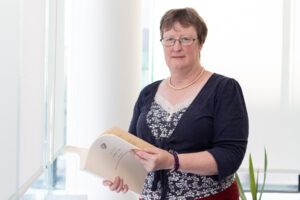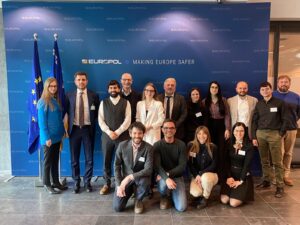Gesine Freund, EBRA Board member and Data Protection Officer & Legal Adviser for Bundesanzeiger Verlag (Germany), explains the challenges facing the Business Registers in relation to Beneficial Ownership and how EBRA is working to bring registries together to discuss challenges and develop solutions.

The introduction of Beneficial Ownership registers has led to a tremendous change in European and national legislation in recent years. Aimed at being additional instruments in the fight against money laundering and organized crime, central beneficial owner registers fulfil a significant role in the security of legal transactions and the implementation of sanctions.
The central figure of each of the registers established by the 4th European Anti-Money Laundering Directive is the Beneficial Owner (BO), being the natural person who ultimately owns or controls a company.
Shaping this definition in practice poses three main challenges: its adaptation to fast-moving European legislation, an interconnection of the various BO registers and the protection of the respective natural person’s rights.
The European Business Register Association (EBRA) has therefore created a Beneficial Ownership Working Group, led by my colleague Ulf Krause from Bundesanzeiger. The Working Group gathers European registry professionals to discuss the key issues, hear perspectives from different jurisdictions and share their best practices.
The Beneficial Ownership Working Group meets several times per year, both online and in-person, and is open to all 42 EBRA members from across Europe, including EU and non-EU member states.
The main focus for the Working Group is to overcome the challenges around the role of the Beneficial Owner while also sharing ideas on opportunities for the future.
Beneficial Ownership under frequent legislative changes
In our fast-paced world, EU legislation must respond quickly to the economic and political challenges of the present. Therefore, each nation in turn is challenged by the implementation of these guidelines specified by the European Commission. This has repeatedly presented BO registers with huge challenges at a legal, technical and personnel level which they had to overcome within very short periods of time.
Due to these frequent new regulations, registers have developed from being rather static, to becoming more active. They have to meet the requirements of the EU and national legislators on the one side, and those of the economy, the rights of the natural persons identified as Beneficial Owners as well as the public on the other side.
While BO registers across the directive’s area of application are being operated by different authorities, they all have one thing in common: They have to be modern digital registers that are not only kept up to date but also accurate in the information they provide.
Finding a unified approach to the term “Beneficial Owner“ and connecting the registers
The relevant EU directive (4th AMLD) introducing the Beneficial Owner left room for the individual countries to develop their own concepts of how to define and determine the term.
While “ownership” and “control” are defining criteria in all BO registers, the data that is being registered differs among them. EBRA members are already exchanging ideas to discuss a uniform way of determining the Beneficial Owner across different countries and jurisdictions.
Another relevant topic for the Beneficial Ownership Working Group is the extension of BO data fields. This raises technical and political questions that is useful to discuss with colleagues across Europe.
The concern around unification of the term and the interconnection of the registers are closely linked. The latter also raises technical, legal and organisational issues. While EBRA as a platform is already connecting different BO registers from an organisational view, BORIS (Beneficial Owner Registry Interconnection System) intends to play a key role providing technical requirements to connect register data. In order to set this up and create such an interconnecting system, it must be ensured in advance that its data is unified.
GDPR-related issues regarding Beneficial Ownership
All the above-mentioned challenges have to take into consideration that the Beneficial Owner is a natural person who is amongst others entitled to numerous rights under the under the GDPR. For me, as a Data Protection Officer this is a topic of specifically high interest.
In implementing the above aspects into BO registers, GDPR will hold a challenge on its own. The GDPR compliant distribution of BO data via BORIS, for instance, will feature in our working group discussions in 2023.
In addition, the Court of Justice of the European Union has recently decided that the provision of the 5th AML-Directive, whereby member states must ensure that the information on the Beneficial Ownership is accessible in all cases to any member of the general public, violates the Charter of Fundamental Rights. It has stated that the public’s access constitutes a severe interference with the rights to respect for private life and to the protection of personal data. This case law will inevitably bring about changes for BO registers.
We need to balance the need for fast access to register information, especially for obligated parties and authorities, with the protection of the personal data to the needed extent.
Opportunities for the future
There will be many discussion topics in the future, especially with regards to BORIS and the GDPR compliant distribution of data via BORIS, which will stimulate the BO registers to discuss possible solutions and exchange ideas.
Further challenges will arise from the aftermath of a global pandemic, the current war in Ukraine as well as broader subjects as the digitalisation of financial transactions and data protection.
Working together within EBRA, we can contribute to the shaping of Beneficial Ownership information management and have the chance to better meet the challenges. By continuing to share information and best practice, the Business Registers can present a unified approach to Beneficial Ownership for a more joined-up Europe. This will enable them to meet the demands placed on them and make an even stronger contribution to combating money laundering.


